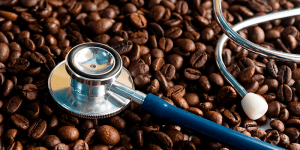Un meta-análisis de consumo de café y té, y el riesgo de glioma en los adultos
27-04-2017
El café contiene muchos compuestos, incluyendo antioxidantes, que podrían prevenir el cáncer, y el café ha sido relacionado con una baja incidencia de cáncer en varios lugares. El té también es rico en antioxidantes, principalmente polifenoles. Para proporcionar una estimación cuantitativa total sobre la relación entre el café, el consumo de té y glioma este estudio combinó todos los datos publicados, a través de un acercamiento meta-analítico. Se realizó una búsqueda de bibliografía durante septiembre de 2012, en las bases de datos PubMed y Embase para identificar estudios observacionales que proporcionan estimaciones cuantitativas en este aspecto. Las estimaciones de los riesgos relativos (RR) acumulado y los intervalos de confianza del 95 % (IC) fueron calculados usando modelos de efectos arbitrarios. Entre los resultados se encontraron seis estudios (cuatro cohortes y dos estudios de casos y controles) disponibles para el meta-análisis, para un total de aproximadamente 2100 casos. El RRs y el IC 95 % de glioma para consumidores contra no consumidores/consumidores ocasionales fue 0.96 (IC 95 %: 0.81-1.13) para el café y 0.86 (IC 95 %: 0.78-0.94) para el té, sin heterogeneidad entre estudios. Cuando se comparó la categoría más alta vs la categoría más baja de consumo, el RR era 1.01 (IC 95 %: 0.83-1.22) para el café, 0.88 (IC 95 %: 0.69-1.12) para el té, y 0.75 (IC 95 %: 0.54-1.05) para el café más el té. En conclusión, este meta-análisis, aunque basado en pocos estudios, sugiere una falta de asociación entre la ingesta de café y el riesgo de glioma, y una tendencia, si existe alguna, de riesgo inferior para el bebedor de té y bebedor de café más y té.
Malerba S, Galeone C, Pelucchi C, Turati F, Hashibe M, La Vecchia C, Tavani A. A meta-analysis of coffee and tea consumption and the risk of glioma in adults. Canc Causes Contr 2013, 24: 267-276.
1. Ohgaki H (2009) Epidemiology of brain tumors. Methods Mol Biol 472:323–342
2. Ricard D, Idbaih A, Ducray F, Lahutte M, Hoang-Xuan K, Delattre JY (2012) Primary brain tumours in adults. Lancet 379: 1984–1996
3. Schottenfeld D, Fraumeni F (2006) Cancer Epidemiology and Prevention
4. Yang CS, Wang X, Lu G, Picinich SC (2009) Cancer prevention by tea: animal studies, molecular mechanisms and human relevance. Nat Rev Cancer 9:429 439
5. Kang SS, Han KS, Ku BM, Lee YK, Hong J, Shin HY, Almonte AG, Woo DH, Brat DJ, Hwang EM, Yoo SH, Chung CK, Park SH, Paek SH, Roh EJ, Lee SJ, Park JY, Traynelis SF, Lee CJ (2010) Caffeine-mediated inhibition of calcium release channel inositol 1,4,5-trisphosphate receptor subtype 3 blocks glioblastoma
invasion and extends survival. Cancer Res 70:1173–1183
6. Fang MZ, Wang Y, Ai N, Hou Z, Sun Y, Lu H, Welsh W, Yang CS (2003) Tea polyphenol (-)-epigallocatechin-3-gallate inhibits DNA methyltransferase and reactivates methylation-silenced genes in cancer cell lines. Cancer Res 63:7563–7570
7. Huber WW, Scharf G, Nagel G, Prustomersky S, Schulte-Hermann R, Kaina B (2003) Coffee and its chemopreventive components Kahweol and Cafestol increase the activity of O6- methylguanine-DNA methyltransferase in rat liver–comparison with phase II xenobiotic metabolism. Mutat Res 522:57–68
8. Liu Y, Shete S, Hosking FJ, Robertson LB, Bondy ML, Houlston RS (2010) New insights into susceptibility to glioma. Arch Neurol 67:275–278
9. Andersen LF, Jacobs DR Jr, Carlsen MH, Blomhoff R (2006) Consumption of coffee is associated with reduced risk of death attributed to inflammatory and cardiovascular diseases in the Iowa Women’s Health Study. Am J Clin Nutr 83:1039–1046
10. Galeone C, Tavani A, Pelucchi C, Turati F, Winn DM, Levi F, Yu GP, Morgenstern H, Kelsey K, Dal Maso L, Purdue MP, McClean M, Talamini R, Hayes RB, Franceschi S, Schantz S, Zhang ZF, Ferro G, Chuang SC, Boffetta P, La Vecchia C, Hashibe M (2010) Coffee and tea intake and risk of head and
neck cancer: pooled analysis in the international head and neck cancer epidemiology consortium. Cancer Epidemiol Biomarkers Prev 19:1723–1736
11. Turati F, Galeone C, La Vecchia C, Garavello W, Tavani A (2011) Coffee and cancers of the upper digestive and respiratory tracts: meta-analyses of observational studies. Ann Oncol 22:536–544
12. Bravi F, Bosetti C, Tavani A, Bagnardi V, Gallus S, Negri E, Franceschi S, La Vecchia C (2007) Coffee drinking and hepatocellular carcinoma risk: a meta-analysis. Hepatology 46: 430–435
13. Je Y, Giovannucci E (2012) Coffee consumption and risk of endometrial cancer: findings from a large up-to-date meta-analysis. Int J Cancer 131:1700–1710
14. Bravi F, Scotti L, Bosetti C, Gallus S, Negri E, La Vecchia C, Tavani A (2009) Coffee drinking and endometrial cancer risk: a metaanalysis of observational studies. Am J Obstet Gynecol 200:130–13515. Galeone C, Turati F, La Vecchia C, Tavani A (2010) Coffee consumption and risk of colorectal cancer: a meta analysis of case-control studies. Cancer Causes Control 21:1949–1959
16. Je Y, Liu W, Giovannucci E (2009) Coffee consumption and risk of colorectal cancer: a systematic review and meta-analysis of prospective cohort studies. Int J Cancer 124:1662–1668
17. Zhang X, Albanes D, Beeson WL, van den Brandt PA, Buring JE, Flood A, Freudenheim JL, Giovannucci EL, Goldbohm RA, Jaceldo-Siegl K, Jacobs EJ, Krogh V, Larsson SC, Marshall JR, McCullough ML, Miller AB, Robien K, Rohan TE, Schatzkin A, Sieri S, Spiegelman D, Virtamo J, Wolk A, Willett WC, Zhang
SM, Smith-Warner SA (2010) Risk of colon cancer and coffee, tea, and sugar-sweetened soft drink intake: pooled analysis of prospective cohort studies. J Natl Cancer Inst 102:771–783
18. Yuan JM, Sun C, Butler LM (2011) Tea and cancer prevention: epidemiological studies. Pharmacol Res 64:123–135
19. Dubrow R, Darefsky AS, Freedman ND, Hollenbeck AR, Sinha R (2012) Coffee, tea, soda, and caffeine intake in relation to risk of adult glioma in the NIH AARP Diet and Health Study. Cancer Causes Control 23:757–768
20. Holick CN, Smith SG, Giovannucci E, Michaud DS (2010) Coffee, tea, caffeine intake, and risk of adult glioma in three prospective cohort studies. Cancer Epidemiol Biomarkers Prev 19:39–47
21. Michaud DS, Gallo V, Schlehofer B, Tjonneland A, Olsen A, Overvad K, Dahm CC, Teucher B, Lukanova A, Boeing H, Schutze M, Trichopoulou A, Lagiou P, Kyrozis A, Sacerdote C, Krogh V, Masala G, Tumino R, Mattiello A, Bueno-de-Mesquita HB, Ros MM, Peeters PH, van Gils CH, Skeie G, Engeset D, Parr CL, Ardanaz E, Chirlaque MD, Dorronsoro M, Sanchez MJ, Arguelles M, Jakszyn P, Nilsson LM, Melin BS, Manjer J, Wirfalt E, Khaw KT, Wareham N, Allen NE, Key TJ, Romieu I, Vineis P, Riboli E (2010) Coffee and tea intake and risk of brain tumors in the European Prospective Investigation into Cancer and Nutrition (EPIC) cohort study. Am J Clin Nutr 92:1145–1150
22. Burch JD, Craib KJ, Choi BC, Miller AB, Risch HA, Howe GR (1987) An exploratory case-control study of brain tumors in adults. J Natl Cancer Inst 78:601–609
23. Efird JT, Friedman GD, Sidney S, Klatsky A, Habel LA, Udaltsova NV, Van den Eeden S, Nelson LM (2004) The risk for malignant primary adult-onset glioma in a large, multiethnic, managed-care cohort: cigarette smoking and other lifestyle behaviors. J Neurooncol 68:57–69
24. Hochberg F, Toniolo P, Cole P, Salcman M (1990) Nonoccupational risk indicators of glioblastoma in adults. J Neurooncol
8:55–60
25. Stroup DF, Berlin JA, Morton SC, Olkin I, Williamson GD, Rennie D, Moher D, Becker BJ, Sipe TA, Thacker SB (2000) Meta-analysis of observational studies in epidemiology: a proposal for reporting. Meta-analysis Of Observational Studies in Epidemiology (MOOSE) group. JAMA 283:2008–2012
26. Hamling J, Lee P, Weitkunat R, Ambuhl M (2008) Facilitating meta-analyses by deriving relative effect and precision estimates for alternative comparisons from a set of estimates presented by exposure level or disease category. Stat Med 27:954–970
27. Greenland S, Longnecker MP (1992) Methods for trend estimation from summarized dose-response data, with applications to meta-analysis. Am J Epidemiol 135:1301–1309
28. Greenland S (1987) Quantitative methods in the review of epidemiologic literature. Epidemiol Rev 9:1–30
29. Higgins JP, Thompson SG, Deeks JJ, Altman DG (2003) Measuring inconsistency in meta-analyses. BMJ 327:557–560
30. Thornton A, Lee P (2000) Publication bias in meta-analysis: its causes and consequences. J Clin Epidemiol 53:207–216
31. Egger M, Smith GD, Schneider M, Minder C (1997) Bias in meta-analysis detected by a simple, graphical test. BMJ 315: 629–634
32. Blowers L, Preston-Martin S, Mack WJ (1997) Dietary and other lifestyle factors of women with brain gliomas in Los Angeles County (California, USA). Cancer Causes Control 8:5–12
33. Giles GG, McNeil JJ, Donnan G, Webley C, Staples MP, Ireland PD, Hurley SF, Salzberg M (1994) Dietary factors and the risk of glioma in adults: results of a case-control study in Melbourne, Australia. Int J Cancer 59:357–362















